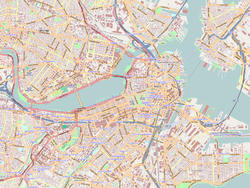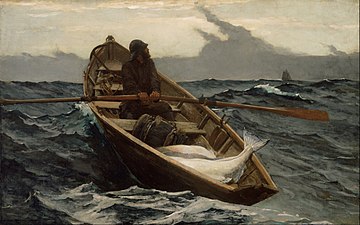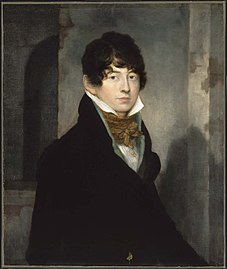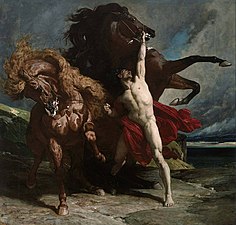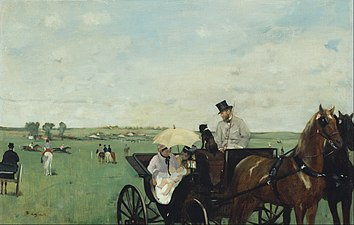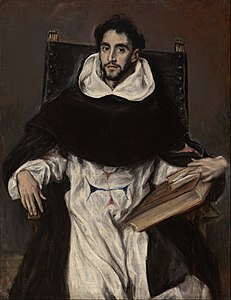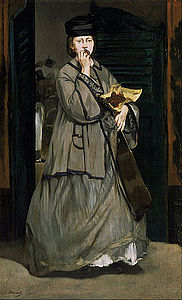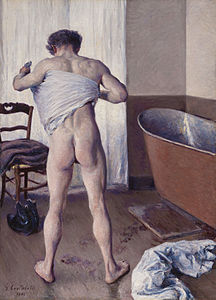Museum of Fine Arts, Boston
 Museum of Fine Arts main entrance with the Appeal to the Great Spirit statue in the foreground | |
 Interactive fullscreen map | |
| Established | 1870 |
|---|---|
| Location | 465 Huntington Avenue Boston, Massachusetts 02115 |
| Coordinates | 42°20′22″N 71°5′39″W / 42.33944°N 71.09417°W |
| Type | Art museum |
| Accreditation | AAM |
| Visitors | 1,249,080 (2019)[1] |
| Director | Matthew Teitelbaum |
| Architect | Guy Lowell |
| Public transit access | Museum of Fine Arts |
| Website | mfa.org |
The Museum of Fine Arts (often abbreviated as MFA Boston or MFA) is an art museum in Boston, Massachusetts. It is the 20th-largest art museum in the world, measured by public gallery area. It contains 8,161 paintings and more than 450,000 works of art, making it one of the most comprehensive collections in the Americas. With more than 1.2 million visitors a year,[2] it is the 79th-most-visited art museum in the world as of 2022[update].
Founded in 1870 in Copley Square, the museum moved to its current Fenway location in 1909. It is affiliated with the School of the Museum of Fine Arts at Tufts.
History
[edit]1870–1907
[edit]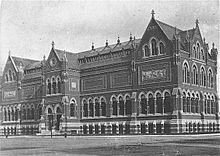
The Museum of Fine Arts was founded in 1870 and was initially located on the top floor of the Boston Athenæum. Most of its initial collection came from the Athenæum's Art Gallery.[3] In 1876, the museum moved to a highly ornamented brick Gothic Revival building designed by John Hubbard Sturgis and Charles Brigham, noted for its massed architectural terracotta. It was located in Copley Square at Dartmouth and St. James Streets.[3] It was built almost entirely of brick and terracotta, which was imported from England, with some stone about its base.[4] After the MFA moved out in 1909, this original building was demolished, and the Copley Plaza Hotel (now the Fairmont Copley Plaza) replaced it in 1912.[5] During the early years of the museum, Charles Greely Loring, a former Union Army general, served as its first director, leading from 1876 to early 1902, when he resigned for health reasons.[6]: 7
1907–1999
[edit]
In 1907, plans were laid to build a new home for the museum on Huntington Avenue in Boston's Fenway–Kenmore neighborhood, near the recently opened Isabella Stewart Gardner Museum. Museum trustees hired architect Guy Lowell to create a design for a museum that could be built in stages, as funding was obtained for each phase. Two years later, the first section of Lowell's neoclassical design was completed. It featured a 500-foot (150 m) façade of granite and a grand rotunda. The museum moved to its new location in 1909.[7]
The second phase of construction built a wing along The Fens to house painting galleries. It was funded entirely by Maria Antoinette Evans Hunt, the wife of wealthy business magnate Robert Dawson Evans, and opened in 1915. From 1916 through 1925, the noted artist John Singer Sargent painted the frescoes that adorn the rotunda and the associated colonnades.[7]

The Decorative Arts Wing was built in 1928, and expanded in 1968. An addition designed by Hugh Stubbins and Associates was built in 1966–1970, and another expansion by The Architects Collaborative opened in 1976. The West Wing, now the Linde Family Wing for Contemporary Art, was designed by I. M. Pei and opened in 1981.[8] This wing now houses the museum's cafe, restaurant, meeting rooms, classrooms, and a giftshop/bookstore, as well as large exhibition spaces.[7] In 1978, the Asiatic Wing was closed because the lack of climate control was jeopardizing the collection. A new control system was contingent upon the completion of the West Wing, and the Asiatic Wing reopened in 1982.[9] The Tenshin-En Japanese Garden designed by Kinsaku Nakane opened in 1988, and the Norma Jean Calderwood Garden Court and Terrace opened in 1997.[7][3]
2000–present
[edit]
In the mid-2000s, the museum launched a major effort to renovate and expand its facilities. In a seven-year fundraising campaign between 2001 and 2008 for a new wing, the endowment, and operating expenses, the museum managed to receive over $500 million, in addition to acquiring over $160 million worth of art.[10]
In 2007, the MFA announced its purchase of a nearby building then occupied by the Forsyth Institute, a dental and craniofacial research organization located at 140 Fenway. The original Beaux Arts building dates from around 1910, and was later expanded with a Brutalist annex building.[when?] The entire property comprised approximately 107,000 square feet (9,900 m2) on 1.6 acres (0.65 ha) of land, located across the street from the main MFA building.[11][12] As of 2023[update], the building is leased to nearby Northeastern University.[13]
During the Great Recession, the museum's annual budget was trimmed by $1.5 million. The museum increased revenues by organizing traveling exhibitions, which included a loan exhibition sent to the for-profit Bellagio in Las Vegas in exchange for $1 million. In 2011, Moody's Investors Service calculated that the museum had over $180 million in outstanding debt. However, the agency cited growing attendance, a large endowment, and positive cash flow as reasons to believe that the museum's finances would become stable in the near future. In 2011, the museum put eight paintings by Monet, Renoir, Pissarro, Sisley, Gauguin, and others on sale at Sotheby's, bringing in a total of $21.6 million, to pay for Man at His Bath by Gustave Caillebotte at a cost reported to be more than $15 million.[14]

A renovation included the new Art of the Americas Wing, featuring artwork from North, South, and Central America. In 2006, the groundbreaking ceremonies took place. The new wing and adjoining Ruth and Carl J. Shapiro Family Courtyard (a bright, cavernous interior space) were designed in a restrained, contemporary style by the London-based architectural firm Foster and Partners, under the directorship of Thomas T. Difraia and Childs Bertman Tseckares Architects (CBT). The landscape architecture firm Gustafson Guthrie Nichol redesigned the Huntington Avenue and Fenway entrances, gardens, access roads, and interior courtyards.
The wing opened on November 20, 2010, with free admission to the public. Mayor Thomas Menino declared it "Museum of Fine Arts Day", and more than 13,500 visitors attended the opening. The 12,000-square-foot (1,100 m2) glass-enclosed courtyard now features a 42.5-foot (13.0 m) high glass sculpture, titled the Lime Green Icicle Tower, by Dale Chihuly.[15] In 2014, the Art of the Americas Wing was recognized for its high architectural achievement by the award of the Harleston Parker Medal, by the Boston Society of Architects.

In 2015, the museum renovated its outdoors Japanese garden, Tenshin-en. The garden, which originally opened in 1988, had been designed by Japanese professor Kinsaku Nakane. The garden's kabukimon-style entrance gate was built by Chris Hall of Massachusetts, using traditional Japanese carpentry techniques.[16][17]
As a result of the COVID-19 pandemic, the museum was closed from March 12, 2020, through September 25, 2020.[18] To recover from the drop in attendance caused by the pandemic, a new logo and branding campaign were announced in September 2022, along with renewed community outreach efforts. These changes were announced in tandem with the opening of the traveling exhibition of an official portrait of former US president Barack Obama by Kehinde Wiley and the accompanying portrait of Michelle Obama by Amy Sherald, both on loan from the National Portrait Gallery in Washington DC.[19]
In November 2020 a significant number of MFA employees voted to unionize due to a long history of unaddressed issues related to workplace conditions and compensation inequities.[20] The workers unionized with the local chapter of the United Auto Workers. After over 96% of the union agreed in a vote, MFA staff went on a strike for the first time on November 17, 2021. Union representatives cited unresponsive engagement from MFA management over multiple issues including stagnant wages, job security, and workplace diversity, as the reason for the strike.[21] The union pointed out that employee wages had been frozen for two years, and that management had so far only offered a 1.75% percent raise over the course of four years. Union representatives contrasted this with MFA director Matthew Teitelbaum's salary which, clocking in at nearly US$1 million, was almost 19 times larger than the average MFA worker.[22]
Collection
[edit]

The Museum of Fine Arts possesses materials from a wide variety of art movements and cultures. The museum also maintains a large online database with information on over 346,000 items from its collection, accompanied with digitized images. Online search is freely available through the Internet.[23] The museum also maintains the Conservation and Art Materials Encyclopedia Online, (CAMEO) a database that "compiles, defines, and disseminates technical information on the distinct collection of terms, materials, and techniques used in the fields of art conservation and historic preservation".[24] CAMEO uses MediaWiki.[25]
Some highlights of the collection include:
- Ancient Egyptian artifacts including sculptures, sarcophagi, and jewelry dating back to approximately 6500 BCE to 600 CE, which were primarily obtained through excavations conducted by George A. Reisner in Egypt and Sudan between 1905 and 1942.[26]
- The Nubian arts, including Kerma pottery, colossal royal statues of Napatan kings, jewels, and imports from Greece and Rome, are represented in the collection of Nubian art.[26]
- Dutch Golden Age painting, including 113 works given in 2017 by collectors Rose-Marie and Eijk van Otterloo and Susan and Matthew Weatherbie.[27] The gift includes works from 76 artists, as well as the Haverkamp-Begemann Library, a collection of more than 20,000 books, donated by the van Otterloos. The donors are also establishing a dedicated Netherlandish art center and scholarly institute at the museum.[28]
- French Impressionist and Post-Impressionist works by artists such as Paul Gauguin, Édouard Manet, Pierre-Auguste Renoir, Edgar Degas, Claude Monet, Camille Pissarro, Vincent van Gogh, and Paul Cézanne
- 18th- and 19th-century American art, including many works by John Singleton Copley, Winslow Homer, John Singer Sargent, and Gilbert Stuart
- Cyrus Dallin's 1908 statue, Appeal to the Great Spirit, is prominently exhibited on the lawn at the museum's entrance.
- The Chinese collections feature a selection of imperial ceramics, ancient bronzes, monumental Buddhist sculptures, and 20th-century and contemporary artwork, spanning nearly every era of Chinese history. The collection of Chinese paintings is particularly noteworthy, with numerous masterpieces from the Song and Yuan dynasties.[29]
- The largest collection of Japanese artworks under one roof in the world outside Japan[29]
- The Hartley Collection of almost 10,000 British illustrated books, prints and drawings from the late 19th century
- The Rothschild Collection, including over 130 objects from the Austrian branch of the Rothschild family. Donated by Bettina Burr and other heirs[30]
- The Rockefeller collection of Native American work[31]
- The Linde Family Wing for Contemporary Art includes works by Kathy Butterly, Mona Hatoum, Jenny Holzer, Karen LaMonte, Ken Price, Martin Puryear, Doris Salcedo, and Andy Warhol.[32]
- A collection of over 1,100 historical music instruments, with selected items displayed in a dedicated music room, with occasional talks, live demonstrations, and concerts.[33]
Japanese art
[edit]
The collection of Japanese art at the Museum of Fine Arts is the largest in the world outside of Japan.[29] Anne Nishimura Morse, the William and Helen Pounds Senior Curator of Japanese Art, oversees 100,000 total items[34] that include 4,000 Japanese paintings, 5,000 ceramic pieces, and over 30,000 ukiyo-e prints.[35][36]
The base of this collection was assembled in the late 19th century through the efforts of four men, Ernest Fenollosa, Kakuzo Okakura, William Sturgis Bigelow, and Edward Sylvester Morse, each of whom had spent time in Japan and admired Japanese art.[34][37] Their combined donations account for up to 75 percent of the current collection.[34] In 1890, the Museum of Fine Arts became the first museum in the United States to establish a collection and appoint a curator specifically for Japanese art.[35][38]
Another part of this collection is a number of Buddhist statues. In the later Meiji era of Japan, around the turn of the 20th century, government policy deemphasizing Buddhism in favor of Shintoism and financial pressures on temples resulted in a number of Buddhist statues being sold to private collectors. Some of these statutes came into the collection of the Museum of Fine Arts.[39][40] Today, these statues are the subject of preservation and restoration efforts, which have been at times viewable by the public in special exhibits.[40][41] In recent years, the museum has also collected a number of works by contemporary Japanese artists. In 2011, they acquired Zetsu no. 8 (絶), the largest work in ceramicist Jun Nishida's Zetsu (絶) series.[42]
Also important for this collection is the exhibition of its items in Japan. From 1999 to 2018, regular exchange of items was conducted between the Museum of Fine Arts and its sister museum, the now-closed Nagoya/Boston Museum of Fine Arts.[35][43] In 2012, the traveling exhibition Japanese Masterpieces from the Museum of Fine Arts, Boston visited the Japanese cities of Tokyo, Nagoya, Osaka and Fukuoka, and was well received.[34][35][44]
In 2023 the museum held an exhibition entitled "Hokusai: Inspiration and Influence" celebrating the origins, works, and cultural impact of Japanese artist Hokusai.[45]
Restitution claims
[edit]In April 2024, the museum donated several 14th-century Buddhist Śarīra relics that were in its collection since 1939 to the Jogye Order as part of an agreement to repatriate artifacts taken from Korea during the Japanese Occupation. The relics will be transferred to the Heoam Temple in Yangju, South Korea, where they are believed to have originated.[46]
Libraries
[edit]
The libraries at the Museum of Fine Arts consist of a main library, eight curatorial departmental libraries, and the Center for Netherlandish Art Library.[47] Collectively they hold over 450,000 items, including 60,000 art auction catalogs, and 150,000 periodicals and ephemera.[47] The main branch, the William Morris Hunt Memorial Library, is named after the noted American artist. In 2021, the main library moved after 18 years at Horticultural Hall, two stops away on the MBTA Green Line.[48] The new entrance for the library is on the first floor of the museum, near Sharf Information Center, in front of the Nina Saunders Suite. About one-quarter of the collection was planned to be housed on the third floor of the museum, along with the book conservation facilities, with the remainder stored off-site.[49] The main library had been open to the public, and the catalog could be searched online through the Fenway Libraries Online (FLO).[50] It is open to researchers for two three-hour sessions per week, but only by appointment requested two weeks in advance, and subject to approval.[47][50] Exhibitions organized by the library staff in coordination with the School of the Museum of Fine Arts at Tufts have been debuted two to three times per year.[51]
Community relations
[edit]The MFA also has a longstanding initiative within the Community Arts program called the Community Artist Initiative Artist Project, where the museum invites a Lead Artist to spend nine months creating works with youth from twelve after-school community organizations in the Boston area. The Artist and the children create a collaborative work of art inspired by the Museum's encyclopedic collection, and the completed project is exhibited in the Edward H. Linde Gallery (168) in the Linde Family Wing for Contemporary Art at the MFA.[52]
The MFA offers accessibility accommodations for visitors who may be visually, audibly, or physically impaired.[53] Special programming and tours are available for blind, ASL-fluent, cognitively-impaired, autistic, and medically assisted guests.[54] In the spring of 2019 it installed new signage for its restrooms, in an effort towards "restroom accessibility for people of all genders and abilities."[55]
The MFA publicly apologized in May 2019 after African-American and mixed-race 12- and 13-year-old visitors were allegedly targeted by employees and told "No food, no drink, and no watermelon", which is considered a racial slur in the US.[56] A museum spokesperson said that the warning was actually "no water bottles", but conceded that there was no way of definitively proving what was actually said. Regardless, all museum staff dealing with school groups were to be retrained in interactions with their guests. The MFA also concluded that two of its members had been deliberately racist, and permanently banned them from visiting its grounds.[57][58][59]
In 2019 the MFA debuted its newly renamed "Indigenous Peoples' Day" (formerly Columbus Day) celebrations, with a focus on Native American art and culture.[60] The events included special displays related to Cyrus Dallin's 1908 Appeal to the Great Spirit, a popular and sometimes controversial sculpture of a Native American warrior located in front of the Huntington Avenue main entrance since 1912. Community comments and feedback concerning the monumental artwork were solicited and displayed.[60] Earlier, in March 2019, the MFA had held a special public symposium to discuss the historical background and present-day significance of the sculpture.[61]
In 2020 the MFA had planned to offer 11 annual Community Celebrations, featuring free admission for all visitors, and special events such as dance performances, music, tours, craft demonstrations, and hands-on art making. This series included day-long Martin Luther King Jr. Day, Lunar New Year, Memorial Day, Highland Street Foundation Free Fun Friday, and Indigenous Peoples' Day celebrations. In addition, on Wednesday evenings, which were already free from 4pm to 10pm, special celebrations of Nowruz, Juneteenth, Latinx Heritage Night, ASL Night, Diwali, and Hanukkah were featured.[62]
To commemorate its 150th anniversary, the MFA offered a free one-year family membership to anyone who attended one of its special Community Celebrations or MFA Late Nite programs during 2020. This "First Year Free Membership" program was available to anyone who had not previously been a member of the museum.[63] The 150th year exhibitions included major shows and events featuring art by women and minority artists.[64][65][66]
Special exhibitions
[edit]The Museum of Fine Arts, Boston, hosts special exhibitions consisting of items borrowed from other museums. These limited time events extend for several months and there are typically three exhibitions taking place concurrently since at least 1996. The collection topics of the special exhibits are divided into 13 categories: Africa and Oceania; Americas; Ancient Egypt, Nubia and the near East; Ancient Greece and Rome; Asia; Contemporary Art; Europe; Jewelry; Judaica; Musical Instruments; Photography; Prints and Drawings; and Textile and Fashion Arts.[67] Most special exhibitions take place at the following galleries: Edward and Nancy Roberts Family Gallery, Linde Family Wing for Contemporary Art, Ann and Graham Gund Gallery, Edward H. Linde Gallery. The exhibitions are usually open to public with a variety of ticket prices. Members of MFA, Boston can also enjoy free admission to any special exhibitions.[68]
Philip Guston Now
[edit]Philip Guston Now is an exhibition organized by the Museum of Fine Arts, Boston; the National Gallery of Art, Washington; the Museum of Fine Arts, Houston; and Tate Modern, London. This show is also considered as America's most controversial art exhibition, as of May 2022. Its controversies are mainly due to much of his work addressing and confronting topics such as white supremacy, racism, anti-Semitism, and violence[69] It was originally planned to open in June 2020, but due to nationwide protests for racial equality, it was postponed to open at May. 1, 2022.[70] The museums were aware of its controversies, so they opened a comment area on their official website for the public to share their thoughts with the museum.[71]
Highlights
[edit]Among the many notable works in the collection, the following examples are in the public domain and have photographs available:
American
[edit]-
Charles Bird King, Still Life on a Green Table Cloth, 1815
-
Fitz Henry Lane, Salem Harbor, 1853
-
Martin Johnson Heade, Passion Flowers and Hummingbirds, c. 1870–1873
-
William Rimmer, Flight and Pursuit, 1872
-
Mary Cassatt, Tea, 1880
-
Winslow Homer, The Fog Warning, 1885
-
Childe Hassam, At Dusk (Boston Common at Twilight), 1886
-
John Singleton Copley, Paul Revere, 1768
-
Gilbert Stuart, George Washington, 1796
-
Washington Allston, Self-Portrait, 1805
-
Mary Cassatt, In the Loge, 1878
European
[edit]-
Claude Lorrain, Apollo and the Muses on Mount Helion, 1680
-
Corrado Giaquinto, Adoration of the Magi, 1725
-
Giovanni Paolo Panini, Picture Gallery with Views of Modern Rome, 1757
-
Henri Regnault, Automedon with the Horses of Achilles, 1868
-
Edgar Degas, Racehorses at Longchamp, 1873–1875
-
Claude Monet, Poppy Field in a Hollow near Giverny, 1888
-
Rogier van der Weyden, Saint Luke Drawing the Virgin, 1435–1440
-
Rosso Fiorentino, The Dead Christ with Angels, 1524–1527
-
El Greco, Fray Hortensio Félix Paravicino, 1609
-
Diego Velázquez, Don Baltasar Carlos with a Dwarf, 1632
-
Francisco Goya, Seated Giant, 1818
-
Édouard Manet, Street Singer, 1862
-
Claude Monet, La Japonaise, 1876
-
Paul Cézanne, Madame Cézanne in a Red Armchair, 1877
-
Auguste Renoir, Dance at Bougival, 1883
-
Vincent van Gogh, La Berceuse, 1889
Antiquities
[edit]-
King Menkaura (Mycerinus) and queen, 2490–2472 BCE
-
Winged Protective Deity, 883–859 BCE
-
Goddess Tawaret, 623–595 BCE
-
Marine Mosaic, 200–230 CE
Notable people
[edit]This section needs additional citations for verification. (November 2023) |
Directors
[edit]- Charles Greely Loring (1876–1902)[6]
- Note: Loring's initial executive title was Curator; his title was changed to Director in 1887.[6]: 7
- Edward Robinson[72]
- Arthur Fairbanks
- George Harold Edgell
- Perry T. Rathbone
- Merrill C. Rueppel
- Jan Fontein
- Alan Shestack (1985–1993)
- Morton Golden (interim; 1993–1994)
- Malcolm Rogers (1994–2015)
- Matthew Teitelbaum (2015–present)
Curators
[edit]- Sylvester Rosa Koehler – first Curator of Prints (1887–1900)
- Ernest Fenollosa – Curator of Oriental Art (1890–1896)
- Benjamin Ives Gilman – Curator (1893–1894?); Librarian (1893–1904); Secretary (1894–1925) Assistant Director (1901–1903); Temporary Director (1907)
- Albert Lythgoe – first Curator of Egyptian Art (1902–1906)[73]
- Okakura Kakuzō – Curator of Oriental Art (1904–1913)
- Fitzroy Carrington – Curator of Prints (1912–1921)
- Ananda Coomaraswamy – Curator of Oriental Art (1917–1933)
- William George Constable – Curator of Paintings (1938–1957)
- Cornelius Clarkson Vermeule III – Curator of Classical Art (1957–1996)
- Jonathan Leo Fairbanks – Curator of American Decorative Arts and Sculpture (1970–1999)
- Theodore Stebbins – Curator of American Paintings (1977–1999)
- Anne Poulet – Curator of Sculpture and Decorative Arts (1979–1999)
Bulletin
[edit]A bulletin appeared under various titles from 1903 to 1983:[74]
- 1903–1925: Museum of Fine Arts Bulletin
- 1926–1965: Bulletin of the Museum of Fine Arts
- 1966–1977: Boston Museum Bulletin
- 1978–1980: MFA Bulletin
- 1981–1983: M Bulletin (Museum of Fine Arts, Boston)
See also
[edit]- List of most-visited museums in the United States
- The Lonely Palette (art history podcast hosted by MFA lecturer Tamar Avishai)
- Nagoya/Boston Museum of Fine Arts (defunct sister institution in Nagoya, Japan)
- School of the Museum of Fine Arts at Tufts
References
[edit]- ^ "Visitor Figures 2016" (PDF). The Art Newspaper Review. April 2017. p. 14. Retrieved March 23, 2018.
- ^ "Museum of Fine Arts Annual Report". Museum of Fine Arts. Retrieved May 20, 2016.
- ^ a b c Southworth, Susan & Southworth, Michael (2008). AIA Guide to Boston (3rd ed.). Guilford, Connecticut: Globe Pequot Press. pp. 345–47. ISBN 978-0-7627-4337-7.
- ^ "An announcement was made..." (hathitrust.org). The Brickbuilder. 8 (12). Boston, MA: Rodgers & Manson: 237. December 1899. Retrieved March 7, 2015.
- ^ "Preserving History Chronicles The Museum of Fine Arts, Boston, Since Its Founding in 1870". artdaily.cc. Royalville Communications, Inc. Retrieved February 27, 2020.
- ^ a b c Gilman, Benjamin Ives (1902). "CHARLES GREELY LORING: DIRECTOR EMERITUS Died August 18, 1902". Annual Report for the Year ... (Museum of Fine Arts, Boston). 27: 1–10. JSTOR 43479221.
- ^ a b c d "Architectural History". Museum of Fine Arts Boston. Retrieved December 8, 2022.
- ^ Baker, Kenneth (July 28, 1981). "On the western front: Checking out the new wing at the MFA". The Boston Phoenix. Retrieved April 10, 2024.
- ^ Baker, Kenneth (November 16, 1982). "The MFA gets re-Oriented: The west wing goes east". The Boston Phoenix. Retrieved October 2, 2024.
- ^ Dobrzynski, Judith H. (November 10, 2010). "Boston Museum Grows by Casting a Wide Net". The New York Times. Retrieved May 14, 2016.
- ^ "MFA buys Forsyth Institute". The Huntington News. August 1, 2007. Retrieved December 8, 2022.
- ^ "MFA, Boston Selects Ann Beha Architects to Develop Master Plan for Forsyth Institute Building". artdaily.cc. Retrieved December 8, 2022.
- ^ "Museum of Fine Arts | Boston, MA | Smith + St. John". Smith + St. John. Retrieved December 8, 2022.
- ^ Judith H. Dobrzynski (March 14, 2012), "How an Acquisition Fund Burnishes Reputations". The New York Times.
- ^ "Lime Green Icicle Tower". Museum of Fine Arts. Retrieved October 26, 2014.
- ^ "Japanese Garden, Tenshin-en". Boston Museum of Fine Arts. March 13, 2015. Retrieved August 16, 2015.
- ^ Takes, Joanna Werch (January 20, 2015). "Chris Hall: A (Japanese-Inspired) Timber Framing Philosophy for Furniture". Woodworker's Journal. Retrieved August 16, 2015.
- ^ "MFA Boston Will Reopen September 26 with Art of the Americas Galleries, "Women Take the Floor" and "Black Histories, Black Futures"". MFA. September 9, 2020.
- ^ Shea, Andrea (September 3, 2022). "Museum of Fine Arts hosts the Obama portraits and unveils a new look". www.wbur.org. WBUR. Retrieved September 5, 2022.
- ^ "In a Landslide Decision, Workers at the Museum of Fine Arts in Boston Become the Latest Major American Museum Staff to Unionize". November 23, 2020.
- ^ Lonas, Lexi (November 12, 2021). "Workers at Boston Museum of Fine Arts vote to hold one-day strike". The Hill.
- ^ Levin, Annie (November 17, 2021). "MFA Boston Staff Hold One-Day Strike for a Fair Contract". Observer.
- ^ "Advanced Search Objects – Museum of Fine Arts, Boston". Museum of Fine Arts, Boston. Retrieved February 19, 2020.
- ^ "About CAMEO". CAMEO: Conservation and Art Materials Encyclopedia Online. Museum of Fine Arts, Boston. Retrieved December 18, 2021.
- ^ "MediaWiki API help". CAMEO. cameo.mfa.org. Retrieved December 18, 2021.
- ^ a b "Art of Ancient Egypt, Nubia, and the Near East". Museum of Fine Arts Boston. Retrieved April 25, 2023.
- ^ "Museum of Fine Arts, Boston, to Receive Landmark Gifts of Dutch and Flemish Art Including Rembrandt Portrait and Other Golden Age Masterpieces". Museum of Fine Arts, Boston. Retrieved October 12, 2017.
- ^ Massive gift of Dutch art is a coup for MFA – The Boston Globe
- ^ a b c "Art of Asia". Museum of Fine Arts Boston. Retrieved April 25, 2023.
- ^ "Museum of Fine Arts, Boston, Announces Major Gift from Rothschild Heirs, Including Family Treasures Recovered from Austria after WWII." Museum of Fine Arts, Boston. February 22, 2015. Retrieved March 3, 2015.
- ^ "Acquisitions of the month: October 2018". Apollo Magazine. November 9, 2018.
- ^ "Contemporary Art". Museum of Fine Arts, Boston. Retrieved February 18, 2020.
- ^ "Musical Instruments". Museum of Fine Arts Boston. Retrieved December 12, 2022.
- ^ a b c d "Spotlight on panelist Dr. Anne Nishimura Morse, curator of Japanese art at the Museum of Fine Arts, Boston". Conference on Cultural and Educational Interchange (CULCON). August 17, 2012. Retrieved July 7, 2020.
- ^ a b c d "Art of Japan Collection and History of Cultural Exchange". Museum of Fine Arts, Boston. Retrieved July 8, 2020.
- ^ "Museum of Fine Arts Boston: Japanese Collections". North American Coordinating Council on Japanese Library Resources. Retrieved July 8, 2020.
- ^ Adamson, Glenn (June 13, 2020). "The Museum of Fine Arts in Boston turns 150". Apollo Magazine. Retrieved July 7, 2020.
- ^ Khvan, Olga (April 3, 2015). "Two New Exhibits Tell Story of Japanese Art at MFA Boston". Boston Magazine. Retrieved July 8, 2020.
- ^ Hintermeister, Henry (February 20, 2018). "An Art History". The Tufts Observer. Retrieved July 8, 2020.
- ^ a b Billman, Ty (June 12, 2020). "A Critical Moment for Japanese Art Curation". Kyoto Journal. Retrieved July 7, 2020.
- ^ "Conservation in Action: Japanese Buddhist Sculpture in a New Light". Museum of Fine Arts, Boston. Retrieved July 8, 2020.
- ^ Hykin, Abigail; Morse, Anne Nishimura (2014). "An Exploration of Finality: Conservator and Curator Examine the Ceramic Sculpture of Nishida Jun". Impressions (35): 84–95. ISSN 1095-2136. JSTOR 24869102.
- ^ "'In Pursuit of Happiness: Favorite Works from the Museum of Fine Arts, Boston". The Japan Times. Retrieved October 8, 2018.
- ^ "Japanese Masterpieces from the Museum of Fine Arts, Boston". Tokyo National Museum. Retrieved July 8, 2020.
- ^ "Hokusai: Inspiration and Influence". Museum of Fine Arts Boston. Retrieved February 13, 2024.
- ^ "Boston museum returns Buddhist relics to S. Korea". Yonhap News Agency. April 17, 2024. Retrieved April 17, 2024.
- ^ a b c "Libraries and Archives". MFA Boston. Museum of Fine Arts Boston. Retrieved January 9, 2023.
- ^ "A Reader's Legacy: Volunteer Leaves Bequest for MFA's Research Library". MFA Boston. Museum of Fine Arts Boston. Retrieved January 9, 2023.
- ^ "MFA Library: William Morris Hunt Memorial Library: Library Newsletter". library.mfa.org. MFA Boston. Retrieved September 5, 2022.
- ^ a b Lee, Hee Jung. "MFA Library: William Morris Hunt Memorial Library: Visiting the Library". library.mfa.org. Retrieved December 12, 2022.
- ^ "MFA Library: William Morris Hunt Memorial Library: Exhibitions". library.mfa.org. Museum of Fine Arts Boston. Archived from the original on February 29, 2020. Retrieved February 29, 2020.
- ^ "Community Arts Initiative: The Artist Project—Call to Artists". Museum of Fine Arts Boston. Retrieved November 10, 2023.
- ^ "Accessibility". Museum of Fine Arts, Boston. Retrieved February 19, 2020.
- ^ "Access Programs". Museum of Fine Arts, Boston. Retrieved February 19, 2020.
- ^ "Tips for Visitors". Museum of Fine Arts, Boston. Retrieved February 19, 2020.
- ^ "Museum of Fine Arts, Boston, Announces Steps to Address Results of Investigation into Davis Leadership Academy Group Visit on May 16, 2019". Museum of Fine Arts, Boston. Retrieved February 19, 2020.
- ^ Sini, Rozina (May 25, 2019). "Boston museum sorry for racist 'no watermelons' remark". BBC News. Retrieved May 25, 2019.
- ^ Garcia, Maria (May 24, 2019). "MFA Bans 2 Patrons After Students of Color Say They Were Subjected to Racist Comments". WBUR. Retrieved May 28, 2019.
- ^ Farzan, Antonia Noori (May 24, 2019). "Black students on a field trip said they were told 'no food, no drink, no watermelon.' Now the museum is apologizing". The Washington Post. Retrieved February 19, 2020.
- ^ a b "Museum of Fine Arts, Boston, Honors Indigenous Peoples' Day with Launch Of Free Community Celebration That Places Native American Voices at the Forefront". Museum of Fine Arts, Boston. Retrieved February 19, 2020.
- ^ "Dallin experts discuss sculptor's work, 'Appeal to the Great Spirit'". The Arlington Advocate. March 12, 2019. Retrieved February 19, 2020.
- ^ "Community Celebrations". Museum of Fine Arts, Boston. Archived from the original on April 25, 2020. Retrieved April 29, 2021.
- ^ "First Year Free Membership". Museum of Fine Arts, Boston. Retrieved February 19, 2020.
- ^ "Museum of Fine Arts, Boston's 150th Anniversary Honors the Past and Reimagines the Future". Museum of Fine Arts, Boston. Retrieved February 19, 2020.
- ^ Close, Cynthia (December 27, 2019). "MFA, Boston Turns 150: Here's How They're Celebrating". Art & Object. Retrieved March 8, 2020.
- ^ Chew, Hannah T. (October 1, 2019). "MFA's 150th Anniversary to Honor the Past and Reimagine the Future". The Harvard Crimson. Retrieved March 8, 2020.
- ^ "Past Exhibitions". Museum of Fine Arts Boston. Retrieved February 26, 2023.
- ^ "Tickets". Museum of Fine Arts Boston. Retrieved April 25, 2023.
- ^ Scott, Chadd. "America's Most Controversial Art Exhibition, Philip Guston Now, Debuts at MFA, Boston". Forbes. Retrieved February 26, 2023.
- ^ Cascone, Sarah (October 28, 2020). "Tate Has Suspended Curator Mark Godfrey for Openly Criticizing Its Decision to Postpone the Philip Guston Show". Artnet News. Retrieved February 26, 2023.
- ^ "Philip Guston Now". Museum of Fine Arts Boston. Retrieved February 26, 2023.
- ^ "Edward Robinson Appointed Director of Boston Art Museum, to Succeed Gen Loring". The Boston Globe. May 28, 1902. p. 14. Retrieved November 5, 2023 – via newspapers.com.
- ^ Bierbrier, Morris L (2012). Who Was Who in Egyptology, 4th edition. Egypt Exploration Society. p. 244. ISBN 978-0856982071.
- ^ "Museum of Fine Arts Bulletin on JSTOR". JSTOR / Museum of Fine Arts, Boston. Retrieved October 8, 2017.
External links
[edit]- Official site
- Virtual tour of the Museum of Fine Arts, Boston provided by Google Arts & Culture
- Anatomy of an Exhibit - How the museum's 1982 Thomas Eakins show was put together The Boston Phoenix
 Media related to Museum of Fine Arts, Boston at Wikimedia Commons
Media related to Museum of Fine Arts, Boston at Wikimedia Commons
- Museum of Fine Arts, Boston
- 1870 establishments in Massachusetts
- Art museums and galleries established in 1870
- Art museums and galleries in Boston
- Asian art museums in the United States
- Buildings and structures completed in 1909
- Culture of Boston
- Egyptological collections in the United States
- Fenway–Kenmore
- Institutions accredited by the American Alliance of Museums
- Landmarks in Fenway–Kenmore
- Mesoamerican art museums in the United States
- Museums of American art
- Museums of ancient Greece in the United States
- Museums of Ancient Near East in the United States
- Museums of ancient Rome in the United States
- Museums of Japanese culture in the United States
- African art museums in the United States

